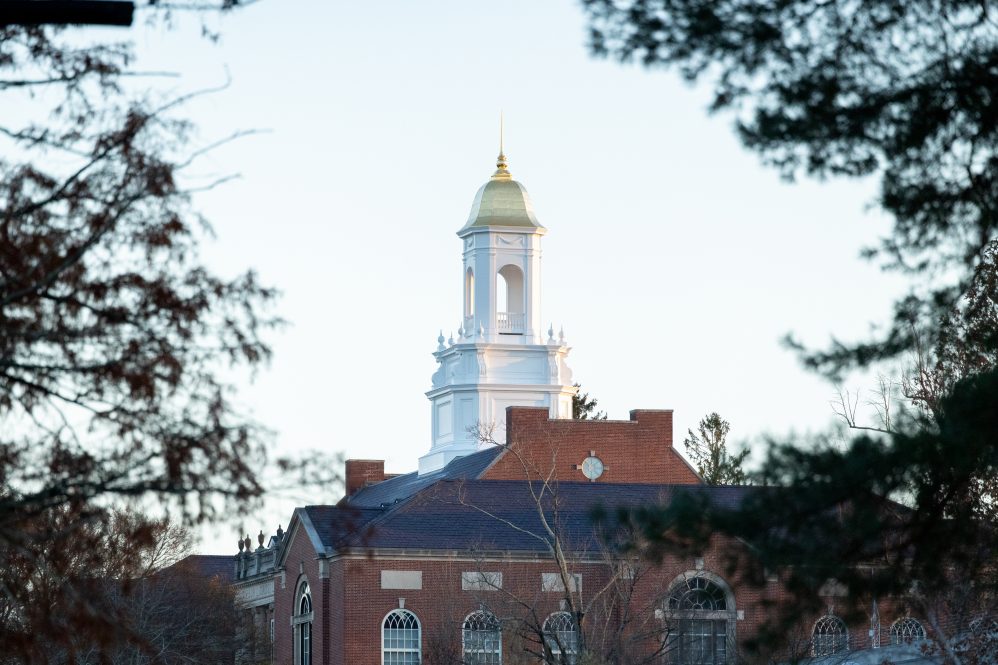UConn will keep almost all of its small academic programs in place in coming years, closing only a handful that have minimal or no enrollment and temporarily suspending a small number of others as their feasibility is more closely evaluated.
Anne D’Alleva, UConn’s provost and executive vice president for academic affairs, presented the findings of her office’s review of low enrollment and/or low completion programs to the Board of Trustees on Wednesday.
The figures had been further refined since D’Alleva gave a preliminary overview last week to the University Senate, but show the same trend now as then: The vast majority of small programs will remain in place, contrary to concerns that some people had publicly expressed about sweeping cuts or impacts to particular departments or fields.
In fact, no undergraduate programs were among those presented or discussed Wednesday for closure or suspension.
“I’m very grateful for the thoughtful engagement of the faculty, department heads, and deans in the low-enrollment program review,” D’Alleva says.
“The recommendations for closure or suspension that the schools and colleges are making to the board are grounded in careful analysis of student demand and faculty workload,” she adds. “Many departments are also bringing forward exciting and innovative ideas for boosting enrollment in programs where we have capacity to grow, and I look forward to working with them on these initiatives.”
The review, which started last spring, is a standard process at universities nationwide to help maintain the right balance of academic programs, meet student needs, make responsible use of resources, and support the institutional mission.
The process did not target any particular disciplinary field and made no assumptions about the programs. Being included in the process did not signal anything other than the fact that the programs’ enrollment and completions were below the thresholds that would be expected in a five-year window.
Those thresholds were 100 or fewer degree completions in undergraduate programs, 50 or fewer in master’s programs, 25 or fewer in graduate-level certificates, and 10 or fewer in doctoral programs.
Four programs will be closed as a result of the assessment’s findings: three graduate-level certificates that have drawn minimal or no enrollment over the last five years and one master’s program whose sole enrolled student graduates in May.
Twelve other programs will be temporarily suspended, including seven certificate programs, four master’s programs, and one doctoral program.
The suspension allows time for the academic units and their faculty to take actions that would support future reinstatement, or to conduct a thoughtful evaluation that may result in permanent closure. That includes assessing the program’s viability, curriculum, resource needs, and alignment with institutional goals and workforce needs.
The potential impact on students is limited, since only 8% of the nearly 6,000 undergraduate degrees completed at UConn in an average year are in majors with 20 or fewer average annual completions.
Across all levels of undergraduate and graduate programs, more than 90% of completions are in programs that are above the thresholds set for review.
The provost office’s academic programs review also served as an organizational tool to identify and remove majors from the catalog that had already been suspended over previous years but were never taken off the books. In fact, the review process identified 22 such programs.
Of the 213 active programs and concentrations within degree programs that were studied in the review, at least 173 will continue. As of Wednesday, they included:
• 22 master’s programs within a doctoral degree pathway or awarded to students who exit a doctoral degree but have met the requirements to earn a master’s degree.
• 71 programs that operate concurrently with one or more others, usually as a subset of a larger curriculum or an interdisciplinary degree program.
• Seven cohorts or classes limited in size by accreditation or other requirements. Typically, those programs limit faculty-to-student ratios or class size in specific courses, and the program leads to some form of professional practice.
• Eight that will be consolidated with other programs to streamline resources and reduce redundancies. The deans and academic units in those areas are working on timelines and consolidation plans.
• 65 programs with the capacity to increase enrollment will continue with monitoring. This gives the academic units additional time to attract more potential students through specialized recruiting efforts, summer programs, Early College Experience courses, or other initiatives.
Evaluation reports are being finalized on 18 others.
Only four programs were slated to close as of Wednesday. Three are graduate-level certificates that have failed to draw enrollment (global health, obesity prevention and weight management, and global risk management). The fourth is a master’s degree focusing on the intersection of politics and popular culture; its sole enrolled student graduates in May.
Trustees approved the closures of the two health-related certificates and the master’s program on Wednesday, and a resolution will be presented to them at a future meeting to close the global risk management certificate program.
Of the 12 to be suspended, seven are graduate-level certificates (adult learning, literacy supports, digital media and design, dementia care, life story practice research, and addiction science). The degree programs in each area continue to offer curriculum covering those topics, however.
A sixth-year certificate offered in educational technology will also be suspended, along with master’s degrees in international studies, medieval studies, survey research, and educational technology and a doctoral degree in medieval studies.



